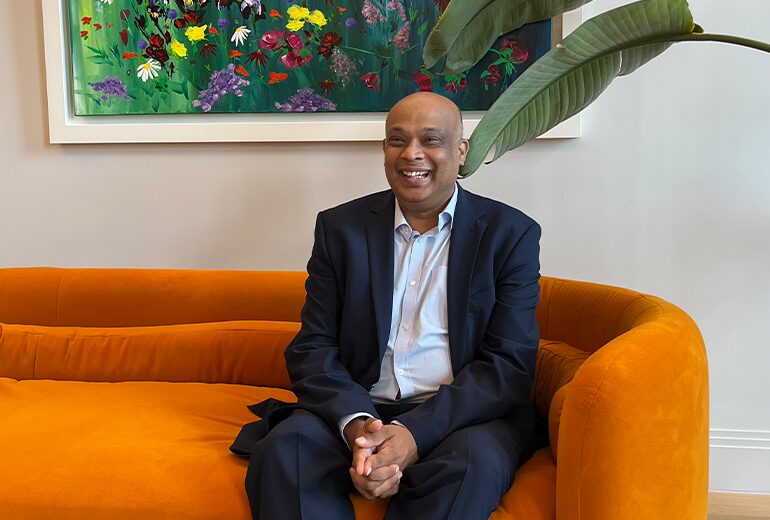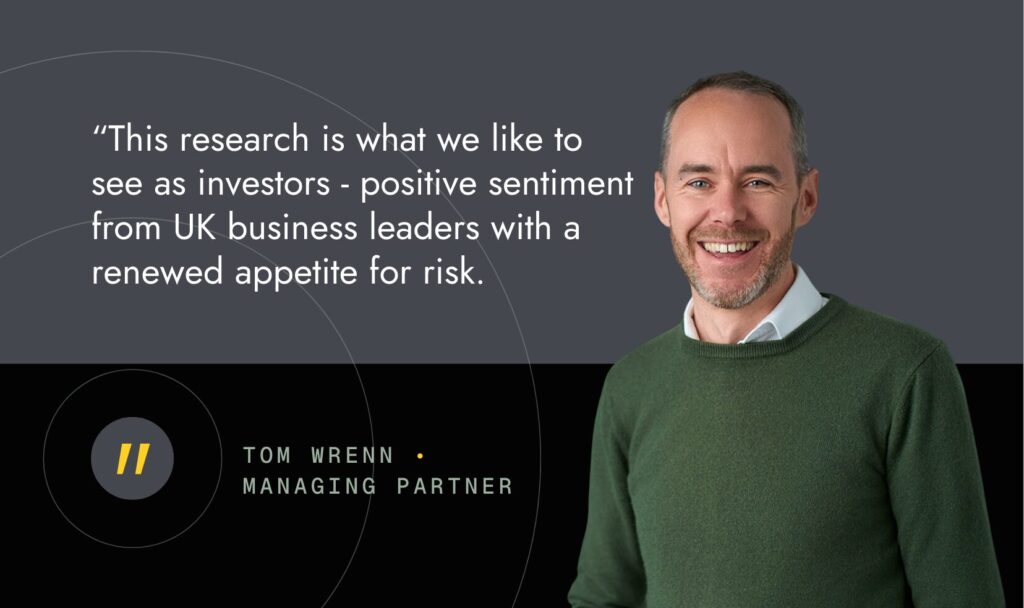ECI has today published its 2026 Impact Report, outlining progress made across our ESG priorities and setting out our objectives for the years ahead.
As a certified B Corp, we believe businesses should be a force for good, creating jobs, supporting economic progress, and making a positive impact for employees, customers, and communities. As part of our Certification, we commit to publicly sharing our ESG objectives and progress made across our goals.
We focus on the areas important to our stakeholders, from the ECI team to our investors, and where ECI often supports management teams to progress on ESG. These are decarbonisation, diversity and inclusion, employee engagement, cyber resilience and charity. Highlights from the past year include achieving 100% carbon data tracking across the portfolio, launching our charity partnership with the Wilderness Foundation and rolling out updated family and caregiving policies following feedback from our employee engagement survey.
Looking ahead, our 2026 objectives include agreeing alignment with a decarbonisation framework, supporting more of our portfolio to track their full footprint, and launching our Rising Stars programme to support diverse talent across the portfolio.

News
09/02/2026
ECI launch 2026 Impact Report

We’re delighted to share the news that ECI-backed ISMS.online (IO), the company changing how global businesses handle data privacy and information security compliance, has announced the appointment of Simon Church as Chair.

Simon joins the business as ISMS.online continues to build on more than a decade of supporting organisations facing rising expectations around security, risk, and regulatory accountability. He brings more than 25 years of experience specialising in cyber security products, services, and solutions. His career has been spent building, operating, and scaling technology-led businesses internationally, often in environments where security, resilience, and trust are fundamental to commercial success.
Alongside his executive background, Simon has extensive experience at board and advisory level across cyber security, managed services, and enterprise software businesses. He has worked with organisations at different stages of maturity, helping to guide decisions around market expansion, go-to-market strategy, partnerships, and investment. This perspective is particularly relevant as IO continues to expand and support a broader range of organisations operating in increasingly complex regulatory environments.
Simon’s appointment as Chair further strengthens IO’s board at a pivotal moment, bringing additional experience and perspective to support the company’s long-term strategy as it continues to scale in the UK and internationally.
We look forward to working with Simon as the business continues to support organisations navigating increasingly complex security, risk, and compliance requirements, and as IO builds on its strong foundation to deliver continued growth and long-term value.
News
02/02/2026
Read Time: 1 Min
IO appoints Simon Church as Chair

Clinical trials have long been seen as complex, costly, and often slow. But, that perception is shifting. With changing tech-stacks, innovative pharma and life sciences businesses are now using their clinical operations as a driver of competitive advantage.
This has changed rapidly in the last few years as smarter data infrastructure, AI-native platforms, and innovators significantly reducing their time-to-market, have caused a market shift. Here are four trends reshaping the clinical trials landscape:
1. Data liquidity is the new battleground
The challenge is no longer data collection—it’s data flow. Expectations are very high, with sponsors wanting real-time access to data, regulators demanding richer and more diverse data, and patients expecting seamless digital engagement. At the 2025 EPA Conference in Amsterdam, we saw that regulators are looking at more Real World Evidence using data from patient registries, insurance claims and electronic health records both during and after trials.
This is driving demand for modular, API-first platforms that can integrate with electronic health records, eConsent tools, wearables and analytics engines—without locking sponsors into rigid workflows. The winners will be those who can orchestrate data across the trial ecosystem while maintaining compliance and control.
2. Decentralisation is evolving into hybrid intelligence
With more trials now happening outside of traditional trial sites, such through virtual consultations, direct-to-patient trial materials, the complexity of trial logistics has increased. Providers need to be able to manage this effectively, and they need to be able to intelligently blend digital and physical touchpoints. This requires platforms that can manage complex, multi-modal workflows—while maintaining a single source of truth for data and documentation.
We have seen this decentralisation of trials support improved engagement over the last decade, but there is still more potential to be achieved. New features such as patient preference modelling and adaptive logistics (i.e. automatically adjusting visit times or inventory management) are all supporting better trial retention.
3. AI is moving upstream—and getting smarter
When we discussed clinical trials technology only two years ago, we were looking at AI as effective for creating efficiencies in ‘data extraction and cleaning, data mapping, analysis, labelling, indexing…’ How much has changed in two years. Now it is being used for everything from simulating trial designs, predicting regulatory outcomes and generating synthetic control arms. These capabilities are reducing trial sizes, accelerating timelines and improving statistical power.
But the real innovation lies in how AI is being embedded across businesses. It is why meaningful solutions aren’t just helping clinical teams, but also regulatory, safety and commercial functions, and why the most important thing isn’t necessarily what the technology can do, but how simple it is for people to use.
4. Investment is flowing into the sector
Global investment in the pharma and healthtech sectors remains strong. In the first half of 2025, investment has continued to flow into companies building the next generation of clinical platforms, AI-native tools and regulatory automation.

Source: PitchBook Data, Inc., Q3 2025 Healthtech VC Trends.
While total $ invested is still down from a peak in 2021, the growth of companies at the seed level, hopefully indicates strong signs of growth for the future, with more emerging companies supporting on regulatory change and the product lifecycle. Clinical operations are no longer a back-office function - they are a growth engine - and the infrastructure that supports them is now a board-level priority.
Insights
26/01/2026
Toby Fitzherbert
Read Time: Min
Clinical trials: from operational burden to strategic engine

2025 was neither an exceptionally good or an exceptionally bad year for SMEs, with modest GDP growth and an ease in inflation, but with rising cost pressures and an increased need for tech investment. So, what will 2026 hold in store for SMEs?
Toby Fitzherbert looks at the five biggest challenges that SMEs are likely to face in 2026 and offers insights into how they can navigate to deliver growth over the next 12 months.
1. Pace of tech change and need to invest in AI
The new world of Gen AI poses both threats and opportunities for SMEs. For those who can adapt and adopt, there is a genuine opportunity to outperform Enterprise-scale competitors. Not only that, but AI allows an SME to scale efficiently without putting significant cost in their business.
However, that makes it sound easy. Foundation models are still evolving rapidly, it is difficult to know which tech will be outsourced vs owned by Microsoft, AI regulation is still uncertain, AI skills are in tight demand, and barriers are cultural as well as structural for all businesses. Many lean SMEs simply do not have the time or the budget to spend on working out the art of the possible.
For this reason, it’s imperative that SMEs find trusted partners in the AI space – consultants and tools that can facilitate the processes and agents required. It is important to remember that SMEs don’t need to deliver all AI solutions themselves, but they should increase expectations on their third-party providers. PSA tools like CMap or HR tech like Ciphr are adopting AI in their processes, so SMEs can benefit from the AI revolution without needing to build the automations themselves.
2. Cost pressures
Rising employment costs will still be the dominant challenge for SMEs in 2026. The Autumn budget created a storm of pressures with the National Living Wage rising again in April 2026 and younger worker rates climbing even faster, while Employer National Insurance thresholds stay frozen. The Employment Allowance uplift will help the smallest end of SMEs, but most will still feel the squeeze. The focus on leveraging tech to automate tasks rather than hiring additional heads will be key, as well as outsourcing. A good example of this is Moneypenny, which allows SMEs to outsource their customer communications by phone and via web chat. It’s also important to maximise the productivity of your people, for example, Ciphr, which allows businesses to automate everything from routine HR tasks to delivering targeted training programmes, helping businesses free up time, improve engagement, and create a more productive workforce.
3. Cyber security and data governance
As businesses accelerate digital adoption and AI opens the ‘surface area’ for cyber-attacks, risks for SMEs will continue to increase in 2026. Threat actors are sophisticated and are targeting smaller firms as they know many lack dedicated security teams. For SMEs, the challenge is balancing resilience with cost, but security must go beyond endpoint protection or employee training, to deliver active monitoring.
Managed IT partners like BCN can monitor 24/7 and test vulnerabilities, while platforms like isms.online simplify ISO 27001 implementation and governance workflows so that cyber is embedded into culture and infrastructure.
4. Go-to-market in an AI world
Buyers continue to expect hyper-personalised experiences, instant responses and seamless digital journeys. At the same time, AI-driven search is reshaping how people discover all businesses, and it is often unhelpful for SMEs who are seeing eroding performance from organic or paid marketing on Google. However, while those that are reliant on ppc to drive leads may find challenges ahead in 2026, more generally, the search landscape has broadened, which may create opportunities for businesses who adapt quickly to tactics such as GEO, LLM optimisation, and increased use of social search across the customer journey. The important thing is not to just watch your organic traffic falling but understand how to adapt to the new world of search.
5. Global macro uncertainty
It may feel like we’ve been predicting global macro uncertainty for a few years now, but, unfortunately, we haven’t yet been wrong. While 2026 should be more measured in terms of inflation and economic shocks, the world still feels very uncertain when it comes to shifting alliances, the what-next on tariffs and supply chain impacts caused by geopolitical instability and climate shocks.
For SMEs reliant on exports or imports, it is likely that there will still be significant disruption over the next 12 months. SMEs must plan for volatility, diversifying their suppliers and end markets, and build financial buffers in their businesses to withstand shocks.
Conclusion
Can SMEs deliver tech transformation while battling rising costs? SMEs who stay agile and adapt to the new world have a real opportunity ahead – especially if they can find partners who can support them to outpace their competitors.
Insights
20/01/2026
5 biggest challenges for SMEs in 2026

2025 was a year of continued evolution and momentum for ECI as we delivered two exits with an average 3.1x return, raised our first Continuation Fund, completed two investments and two portfolio bolt-on acquisitions, and saw double-digit revenue and EBITDA growth across the portfolio.

We completed two strategic investments in Insurance Insider and CSL alongside two portfolio company bolt-on acquisitions. CSL acquired EdgeConnect, a multi-award-winning internet connectivity solutions specialist, while IGG's acquisition of KGC Associates further strengthened its governance offering to clients.

Portfolio companies delivered double-digit revenue and EBITDA growth in 2025, with international revenue now exceeding 50% of total revenue, representing 14% growth in the last 12 months. 2025 saw ECI hold two portfolio summits as part of its ECI Unlocked program, the Digital Growth Summit and Performance Summit, bringing together leadership teams to share insights and best practices.

We welcomed five new team members: Georgia, Ben, Neal, Simona, and an upcoming joiner in Investor Relations. The year also gave us the opportunity to celebrate Ash Patel's 25 years with ECI and Philip Shuttleworth's upcoming retirement after 30 years with us.



AI at ECI
ECI launched its AI Task Force (AITF) in 2025, a cross-functional committee providing centralised oversight for all AI-related activity across both ECI and delivering connectivity across the portfolio.
We also further enhanced our proprietary AI tool, Amplifind™, with the launch of Amplifind™360, to support our portfolio drive efficiency, visibility and collaboration across their M&A pipeline, and the launch of the Amplifind ™ Deep Research tool, transforming how we approach company analysis and market intelligence through AI agents across trusted sources.

ESG at ECI
In 2025, ECI became an EDCI signatory to enhance the robustness and transparency of portfolio ESG data. We also worked with our portfolio to improve carbon tracking, with 100% of our existing portfolio (companies in portfolio over 12 months) now tracking carbon data, providing a foundation for us to help them with decarbonisation initiatives. In 2025, we selected Wilderness Foundation as our charity partner, an organisation that uses nature-based therapy and outdoor learning to help vulnerable young people build resilience and improve mental health.

Insights
15/01/2026
ECI’s 2025 year in review

We're delighted to announce the exit of Peoplesafe, a global provider of workforce safety software products and services for lone workers and at-risk workers, to Summa Equity, generating a return of 2.7x since we first invested in the company in 2018.
Founded in 2001, Peoplesafe has more than 25 years of experience supporting employers and protecting lone and frontline workers in increasingly complex and hybrid work environments. It serves public and private sector customers across industry, healthcare, real estate, retail, utilities, and more.
Peoplesafe equips workers with real-time access to emergency support. Employees access the support through several integrated safety solutions including mobile apps, dedicated devices, and a 24/7 in-house Alarm Receiving Centre (ARC). These are all connected through Peoplesafe’s own software platforms, Nexus and Lighthouse. Over the past year, the company launched Travelsafe, a safety travel app for employees, and Apple Crash Detection to protect employees during work-related travel. They also introduced Roamsafe, so that employees can maintain connectivity even in low-signal areas. This has also supported AI features being launched by the business, including Alarm Intelligence, which seeks to expedite response and enhance health and safety reporting by summarising complex technical incident logs into digestible summaries. Increasingly, Peoplesafe also integrates directly into organisations HCM and workforce management platforms.
Advisors:
Baird: Corporate Finance
Squire Patton Boggs: Legal
PwC Strategy &: Commercial Due Diligence
PwC: Financial Due Diligence
Crosslake: Technology Due Diligence
Capstone: Regulatory Due Diligence
Liberty Corporate Finance: Management Advisory
News
13/01/2026
Read Time: 3 MINUTES
ECI exits Peoplesafe delivering a 2.7x return

Following a strong 12 months for the ECI team, we are pleased to announce two promotions as we enter 2026. These are:
Ludvig Hamilton is promoted to Investment Manager. Having joined ECI in 2024, Ludvig has already made a significant impact, supporting on the investment in Croud and the successful exit of CSL into a continuation fund in October 2025, generating a 3.5x return. Ludvig has also helped build ECI’s presence in the Nordics market.

Sam Veevers is promoted to Associate within the Origination team. Having also joined in 2024, Sam has played a key role in further developing and leveraging ECI’s proprietary AI-powered platform, Amplifind™, to enhance the firm’s deal origination capabilities. His work has helped ECI source, prioritise and assess leads more effectively, strengthening our ability to identify the best investment opportunities. He has also supported with the launch of Amplifind™360, leveraging the same technology to help our management teams with their own strategic M&A pipeline.

News
12/01/2026
Read Time: 3 MINUTES
ECI announces two promotions for 2026

How willing are UK business leaders to take risks? Nearly half of CEOs and business owners (47%) in the UK now say they are more willing to take risks than a year ago, according to research commissioned by ECI.
Although appetite varies sharply by sector, we see technology businesses the most confident, with 58% reporting a higher appetite for risk, followed by HR companies (57%). The research, which saw responses from over 300 business leaders in the UK, has also found that confidence increases with company size, with more than half (57%) of businesses with over 500 employees saying they are more open to risk than last year.
Cost pressures remain the dominant challenge
Despite improving sentiment, rising costs remain the single biggest concern for UK businesses, cited by one third of respondents. Digital transformation (14%), the perceived threat from AI (13%), and regulation and compliance (11%) also feature prominently.
Different sectors have also shown different priority levels when it comes to challenges. For healthcare businesses, digital transformation is front and centre (71%). Rising costs are a particular concern in technology (44%), while talent shortages are most acute in healthcare (40%).
Good prospects for private equity investment
The findings point to a robust outlook for private equity, with 57% of businesses currently considering PE investment, with interest being strongest among travel companies (69%) and technology businesses (67%).
International expansion firmly on the agenda
Confidence is also translating into ambition with 84% of medium-sized businesses now considering international expansion as a growth driver in 2026.
When it comes to funding international growth, private equity and venture capital come out on top (35%), ahead of government grants (26%) and bank finance (23%). Medium-sized companies surveyed are most likely to be considering private equity for international expansion (40%) with those in the travel industry particularly interested in using private equity to expand overseas (50%), followed by financial services (47%).
Businesses value expertise as much as capital
When asked about the benefits of private equity, respondents highlighted sector expertise and networks (32%) above all else, followed by technology and AI expertise (28%), international reach (18%) and access to talent (10%).
Tom Wrenn, Managing Partner at ECI, commented: “This research is what we like to see as investors – positive sentiment from UK business leaders with a renewed appetite for risk, especially amongst tech CEOs. What is particularly striking is the number of management teams actively considering private equity as they look to expand internationally and navigate the shifting sands of GenAI. We see this from the Founders and CEOs we speak with, who are looking for experience and expertise from their partner to navigate the growth opportunities ahead of them. Across five decades of investing, we’ve refined a repeatable value creation model, which is one reason many CEOs look to partner with ECI. The findings underline that businesses increasingly see PE as a strategic partner, not just capital.”
Insights
08/01/2026
UK business leaders show renewed appetite for risk as confidence returns

